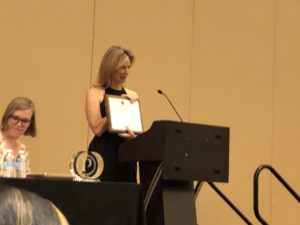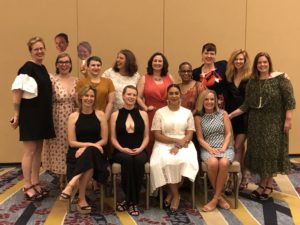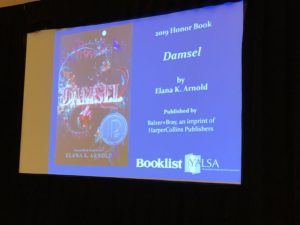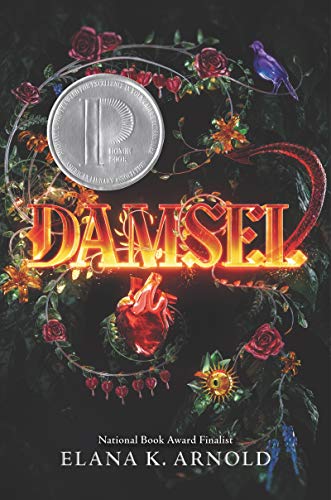Michael L. Printz: A Speech
On Monday, June 24th, I attended the Printz ceremony where DAMSEL was honored alongside I, CLAUDIA by Mary McCoy, A HEART IN A BODY IN THE WORLD, by Deb Caletti, and winning book THE POET X by Elizabeth Acevedo.
Here’s what I said:
When the Printz committee called to tell me that DAMSEL had been named an honor book, I was in the audience of my daughter Davis’s performance. She was playing Jenna Roland in BE MORE CHILL, and she was amazing. It was after the curtain dropped and we were waiting for Davis that I checked my phone. I still have the message recorded. I had to sit down to return the call. My legs were shaking. And I am so very grateful, Printz committee, for your recognition of DAMSEL.
Rachel, Sam, Danielle, Karen, Teka, Jessica, Jennifer, Anna Grace, and Paula, thank you all for this incredible honor.
Being here tonight is made even more thrilling as I have the honor of sharing this space with Deb Caletti and Mary McCoy and winner Elizabeth Acevedo, all writers whose work I deeply admire and respect.
I’m indebted to MaryLynn Reise, who lent me her apartment in San Francisco, where DAMSEL was conceived, and to Martha Brockenbrough, who provided the spark.
I’ve been incredibly fortunate to have Rubin Pfeffer as my steadfast agent since 2010. I’m especially grateful that his philosophy has always been that my job is to write the books—whatever they may be—and that his job is to find homes for them. This has meant that I’ve been supported in following whatever lights me up—in this case, a sudden, fierce, and intense need to write a fantasy novel, something I’d never considered doing before.
And it has been my supreme good fortune that DAMSEL’s home is with Jordan Brown and the team of Balzer & Bray.
Jordan Brown is the kind of careful, considerate editor that every writer dreams of finding. It’s a constant joy, Jordan, to work with you on books that run the gamut from loving kindness and skunk care to dragonhearted disemboweling of the patriarchy. Thank you for your partnership. I appreciate you more than you could know.
Alessandra Balzer and Donna Bray—thank you for your willingness to elevate my exploration of embodied female rage. Patti Rosati, I so appreciate your work as Director of School and Library Marketing, helping DAMSEL find her way into the hands of adult readers who, in turn, can share her with teens. To the entire team at Balzer & Bray, thank you for helping this dragon spread her wings. And thank you also for DAMSEL’s beautiful cover.
Max, Davis, and Keith, my family who is here with me tonight—what can I say other than I love you, I love you, I love you.
DAMSEL is a novel-length original fairy tale about a world in which, in order to become king, the prince must, single-handedly conquer a dragon and rescue a Damsel, whom he will take home to be his bride. That is the way it has always been, and so the book opens with Prince Emory of Harding on his way to Do the Thing, as is his duty.
The second section of the book shifts to the Damsel’s point of view when she wakes, naked in Emory’s arms with no memory. When she asks, who am I? Where am I?, Emory basically says, don’t worry about it. You’re the Damsel, and now I’m king. Just… sit there and look pretty. And don’t ask too many questions.
DAMSEL is a book about how patriarchy hurts everyone. With some distance, I’ve discovered that DAMSEL is about other things, as well. One thing I’ve come to see is that each of my young adult books published so far ends in the same way—with a girl stepping alone, head up, into her future. DAMSEL’s protagonist Ama is different in that she flies rather than steps, but the gist is the same.
Reflecting on this, I recognized that one thing these books say is that sometimes, you can only save yourself. Sometimes, if you’ve been damaged by circumstances, family, abuse, you may not yet be in a position to lead others out of harm. Sometimes, the best you can do is to get out.
Another thing I’ve come to see about DAMSEL is that it is a book is about boundaries—who builds them, who supports them, and who tears them down. The Kingdom of Harding, where Emory brings Ama, is surrounded by a Wall which is inset with thousands of glass eyes, all blown by the Kingdom’s resident Glassblower. His is the Gaze through which we see the world.
As children, we all operate from inside borders into which we have been born. Some of the walls that divide us, we see, but others can be invisible. The teen years are when, for many of us, those walls, once translucent, become undeniably visible. And then we make choices: Do we accept them? Do we reinforce them? Or do we work to tear them down?
Some reviewers and critics feel strongly that DAMSEL is not a “YA” book. Some say its messages will go over the heads of its intended audience—presumably teen girls. Some say the content is too heavy for teen readers, that it’s too “dark,” that the book is too subversive, too angry, too disturbing, too gross.
I think these criticisms say more about the walls people want to keep around our collective damsels—teen girls—than they say about the book.
It would be a beautiful fairy tale to live in a world where no one experiences sexual assault, gaslighting, or abuse. But that is not the world we live in. Our world is one in which issues of sexual violence are among the experiences and concerns of real-world teens, and I think some of the most interesting and important work that we can do as writers of fiction is to examine real-world problems through a fantasy lens. I think teenagers deserve this—they deserve us doing the work of leaning in, of being uncomfortable, of pushing back.
I’ve come to see that part of my work as a writer of young adult fiction is to push against the walls that try to limit what “YA” fiction is. It’s deeply gratifying to be alongside Liz, Deb, and Mary, writers who have leaned their shoulder against the walls and pushed, and to be doing this work among this brilliant network of librarians, readers, authors, and artists.
They are big, heavy walls. But we are legion, and stronger. Thank you.




Elana, this is a terrific speech.
Thank you so much, Linda!
I love your books!